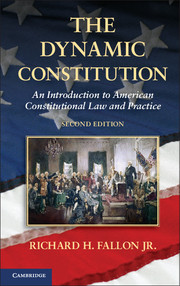Book contents
- Frontmatter
- Contents
- Preface to the Second Edition
- Preface to the First Edition
- Prologue: The Affordable Care Act and Other Vignettes
- Introduction
- Part I Individual Rights under the Constitution
- Part II The Constitutional Separation of Powers
- Part III Further Issues of Constitutional Structure and Individual Rights
- 10 Structural Limits on State Power and Resulting Individual Rights
- 11 The Constitution in War and Emergency
- 12 The Reach of the Constitution and Congress's Enforcement Power
- 13 Conclusion
- Appendix: The Constitution of the United States
- References
13 - Conclusion
Published online by Cambridge University Press: 05 May 2013
- Frontmatter
- Contents
- Preface to the Second Edition
- Preface to the First Edition
- Prologue: The Affordable Care Act and Other Vignettes
- Introduction
- Part I Individual Rights under the Constitution
- Part II The Constitutional Separation of Powers
- Part III Further Issues of Constitutional Structure and Individual Rights
- 10 Structural Limits on State Power and Resulting Individual Rights
- 11 The Constitution in War and Emergency
- 12 The Reach of the Constitution and Congress's Enforcement Power
- 13 Conclusion
- Appendix: The Constitution of the United States
- References
Summary
[The] constitution [was] intended to endure for ages to come, and consequently, to be adapted to the various crises of human affairs.
– Chief Justice John MarshallI have a dream.
– Dr. Martin Luther King Jr.IN THE INTRODUCTION, I EMPHASIZED THAT THIS WOULD BE a book about American constitutional practice – not just about the Constitution as a written text, but about the social, cultural, and political processes through which constitutional law emerges. To a large and possibly excessive extent, the Supreme Court has tended to dominate the book, because the Court stands center stage in the production of constitutional doctrine. But the Court is not the only actor in the drama. In this concluding chapter, I therefore want to step back from the details of constitutional doctrine and offer a few summary theses about the role of the written Constitution and the Supreme Court in our constitutional practice.
Our Constitution is an adaptable document, which draws its meaning partly from evolving thinking and the pressure of events. In the course of this book, I have offered many illustrations of this claim, such as the historical flow of power to the Executive Branch, the expansion – and more recently the partial contraction – of congressional power under the Commerce Clause, the recognition of increasingly broad rights to freedom of speech and association, and the evolving interpretation of the Equal Protection Clause. To reiterate just one vivid example, the Constitution as originally written imposed no obligation on the federal government to accord all citizens “the equal protection of the laws,” and no subsequent amendment has added such a requirement.
- Type
- Chapter
- Information
- The Dynamic ConstitutionAn Introduction to American Constitutional Law and Practice, pp. 353 - 362Publisher: Cambridge University PressPrint publication year: 2013



